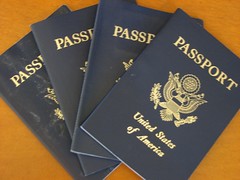Hi Curtis,
I just came across your very interesting blog while doing some research and am wondering if I might bother you with a question:
I had a felony conviction for [a nonviolent crime] 20 years ago here in the U.S. I would like to relocate to South America. Is this an impossible dream?
Many thanks,
Bob
Additional information from our email exchange: the "Bob" in question is a highly skilled professional, but he's an older worker. He's mentioned two countries he is particularly interested in. He probably has another 10 to 20 years of work left. Despite his felony conviction, he does not wish to pursue the Chilean immigration loophole. If he were twenty years younger and had no criminal record, I suspect he would have no trouble moving abroad with his profession.
Dear Bob,
This one is hard, but it's not insurmountable. It is, however, going to take a bit more effort than usual because I assume you want to minimize your chances for failure.
Consider the average person working for the government and processing plenty of work permit/immigrant visa requests. They usually have two things to consider:
- The benefits of your professional skills.
- The drawbacks of your personal situation.
I've been to your Web site and assuming your background can be easily verified, you have strong skills that I assume would be highly desirable. So what are the drawbacks?
- You're close to retirement age.
- You have a felony conviction.
Both of those are pretty serious. So the overworked, underpaid civil servant who evaluates your paperwork may very well glance at your application and say NOPE. They often have plenty of applications to process and the more they get done, the better they look and it's pretty easy to justify saying "no" to a convicted felon.
A twenty-year old non-violent felony is not an automatic bar for many countries, but if you don't work harder to maximize your chances, you're running a real risk of being denied. You have some very positive things on your resume, including suggestions that you benefit the community above and beyond just your normal profession, but all it takes is your application winding up in the hands of the wrong civil servant and you could be sunk.
So what do you do? I recommend a multi-pronged strategy partly aimed at ensuring that your visa application gets more attention than normal rather than a routine assessment by a clerk.
First, if you don't already know the language of your target country, learn it fluently. From the countries you mentioned, it's clear that Spanish is your first choice. If you can communicate effortlessly in your target language, it's a huge benefit. Also, if you have existing clientele with whom you communicate in that language, I would include this information (even if you can't mention who they are) to make it clear that you can hit the ground running.
Second, you live in a large city which is very likely to have cultural groups affiliated with your target countries. Go to those groups, meet the people, make it clear you have a genuine interest in their culture and start making contacts. You never know when you'll run into someone who says "my cousin works for the Director of Immigration for country X". Networking, being honest and open, and helping out where you are able can work wonders. Further, having a demonstrable interest in the culture can help.
Third, research immigration lawyers in your target country. There are two benefits here. The obvious one is that you want solid inside advice on how to enter their country legally. The less obvious one (and this is where strong research will really pay off) is finding one that has contacts. If you can work with a politically-connected lawyer, they can whisper into someone's ear and this can dramatically improve your chances. Yes, this is going to cost you money. It might cost you more money than you are willing to part with. You'll have to judge whether this risk is worth it. Be careful, though, as you could spend a large amount of money on someone who isn't able to help beyond normal legal advice. Even if you don't want to find a politically connected lawyer, make sure you get a lawyer anyway. I have a friend who recently entered the US and due to contacting a lawyer, managed to avoid a huge immigration mess about a particular situation they weren't aware of but the lawyer was.
Fourth, research your target countries like nobody's business. If you wind up chatting with an immigration official and he asks you what you think about the current government, not being able to name the President isn't going to help. You need to be completely reassuring that you're familiar with the culture. Also, if that happens, try to sidestep issues with politics and religion unless they make it very clear what their leanings are (and don't argue against their point of view!) I would probably try refocusing the conversation on how you want to help the country (and given your background, you have some strong assets there).
On a final note, since you've mentioned more than one country as a possible destination, be aware that just because one country turns you down doesn't mean that all of them will. Many countries will occasionally accept people with criminal records and often they will judge based on how long ago the crime occurred (a bonus for you) and the seriousness of the crime. You have an unusually strong strong post-conviction resume that will help tremendously. You're going to have to do a bit more work than usual to make this happen, but if you're determined, I'm sure you can.
Good luck and let me know how it turns out!









.jpg)
.jpg)

_001_(red%C3%A9coup%C3%A9).jpg)











